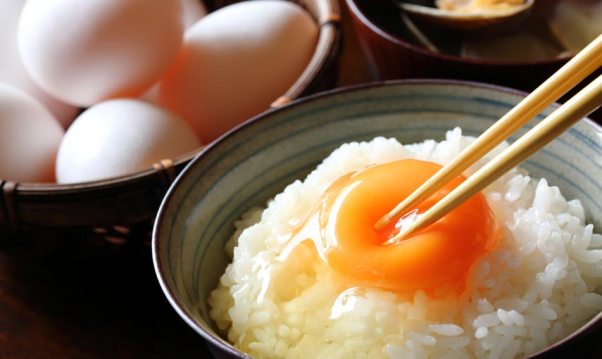
Eating raw eggs is not a common practice in other countries, but it is pretty standard in Japan. Many recipes use raw eggs, and one of the most popular and easy-to-make dishes is “tamago kake gohan,” which is a raw egg mixed with rice. In addition to “tamago kake gohan,” there are also various dishes in Japan that use raw eggs, such as “sukiyaki” and “tsukimi udon.” However, in some countries where only the egg yolk is consumed, the texture of raw eggs may not be preferred if there is no custom of eating the egg white and yolk together.
Risk of Salmonella infection.
Furthermore, Japan’s perception of safety and hygiene regarding raw eggs differs from other countries. For instance, there is a risk of contracting salmonella from the eggshell when the egg has been contaminated with bacteria from chicken feces. In addition, when chickens are infected with salmonella, it can be passed down to eggs during the formation process. Thus, cooking eggs thoroughly is a common practice in many countries to prevent salmonella infection when consuming eggs.
Why can eggs be consumed raw in Japan?
In Japan, hygiene management and quality control of eggs are thoroughly implemented, and the eggs are shipped without bacteria contamination, as Japan prioritizes raw consumption. The environment in chicken coops is arranged to prevent chickens from contracting salmonella, and during distribution, the eggshells are washed and sterilized. In addition, the eggs are usually labeled with a shelf-life of approximately two weeks to ensure the safety of raw consumption. Conversely, cooking eggs is a common practice in other countries, and eggs have a longer shelf-life of up to one or two months.
About quality management in Japan
The Japanese egg industry’s quality management system is considered the world’s best as they use high-quality feed for hatched chicks produced under strict safety regulations. The feed for the chickens is manufactured in factories based on the “Feed Safety Law,” which ensures the meal is safe for consumption. The eggs from these chickens are then gathered at a ” GP Center facility,” where strict quality control processes such as egg washing, inspection, and selection are performed. After being packaged with minimal human handling under perfect hygiene management, they are sold at stores. In addition, the eggs undergo several quality checks, ensuring the Japanese egg industry has a highly controlled and managed system.
Japan’s Unique Rule
The Japan Poultry Association has a unique standard that states that while eggs have a “best before” date, there is no “expiration” date. This is because, with careful hygiene management, the eggs can still be consumed after being cooked, even if the expiration date has passed. This rule is unheard of in other countries.
How to Tell if an Egg is Fresh
The freshness of an egg can be determined by the yolk and egg white when the egg is cracked open. There are two points to look for. First, the egg white should not be spread out. The thick egg white around the yolk is called “dense egg white,” It spreads out when the egg is old. Therefore, an egg with firm, dense egg white indicates freshness.
The other point is that the yolk should be raised. The dense egg white is firm, so the yolk is also increased and firm. This shows how closely the relationship between the yolk and the egg white is. Please try to determine the freshness of eggs based on these points.
In this article, you can see that Japanese eggs are very safe compared to those from other countries. However, it’s important to remember that raw eggs from other countries can be dangerous. Raw food is delicate and easily spoiled, so handling it with proper knowledge is essential.
Japanese eggs are only exported to Hong Kong, Thailand, and Singapore, but the Japan Poultry Association plans to expand its exports. If that happens, the day when Japanese dishes like “tamago kake gohan” or “sukiyaki” can be enjoyed in other countries may not be far off.












